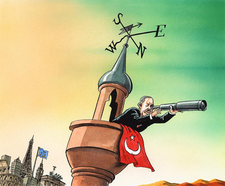Turkey Raises Central Asian Profile Through SCO Link
By Richard Weitz (vol. 5, no. 14 of the Turkey Analyst)
The decision of the June 6-7 annual meeting of the heads of state of the Shanghai Cooperation Organization (SCO) in Beijing to designate Turkey a formal dialogue partner of the organization is yet another sign of recognition of Turkey’s growing influence in Central and South Asia. Turkey’s new status may also reinforce Ankara’s influence in the region, especially now that other NATO members are reducing their presence in Afghanistan. But Turkey still confronts major obstacles to pursuing its ambitious diplomatic agenda in Central and South Asia. China was likely supportive of deepening the SCO’s ties with Turkey, but Turkey’s relations with Russia might worsen, which in that case will constrain Turkish influence in Central Asia.
How Serious is Erdogan about Joining the SCO Instead of the EU?
by Halil M. Karaveli (vol. 6, no. 2 of the Turkey Analyst)
Recep Tayyip Erdoğan’s talk of joining the Shanghai Cooperation Organization and abandoning the pursuit of EU membership cannot be dismissed as loose talk, but neither does it herald a major strategic pivot. The Turkey of Erdoğan will continue to privilege and nurture its relations with the West, above all with the U.S., Erdoğan’s anti-Western prejudices and sentiments notwithstanding. And Erdoğan’s embrace of a club of autocrats should not obscure the fact that a very significant portion of the population of Turkey still endorses the goal of EU membership, and that holds true not least among the voters of the ruling Justice and Development Party (AKP).




